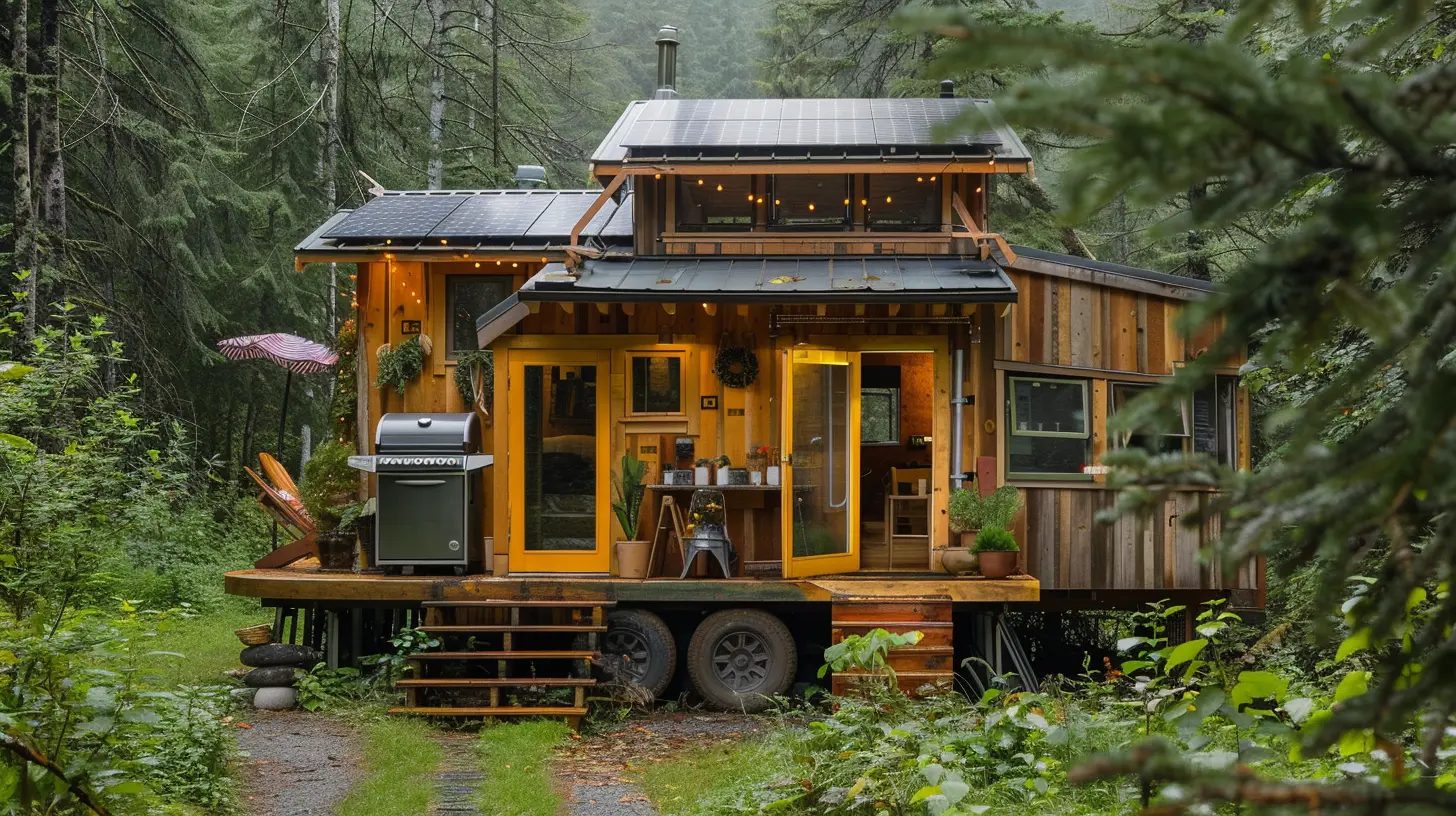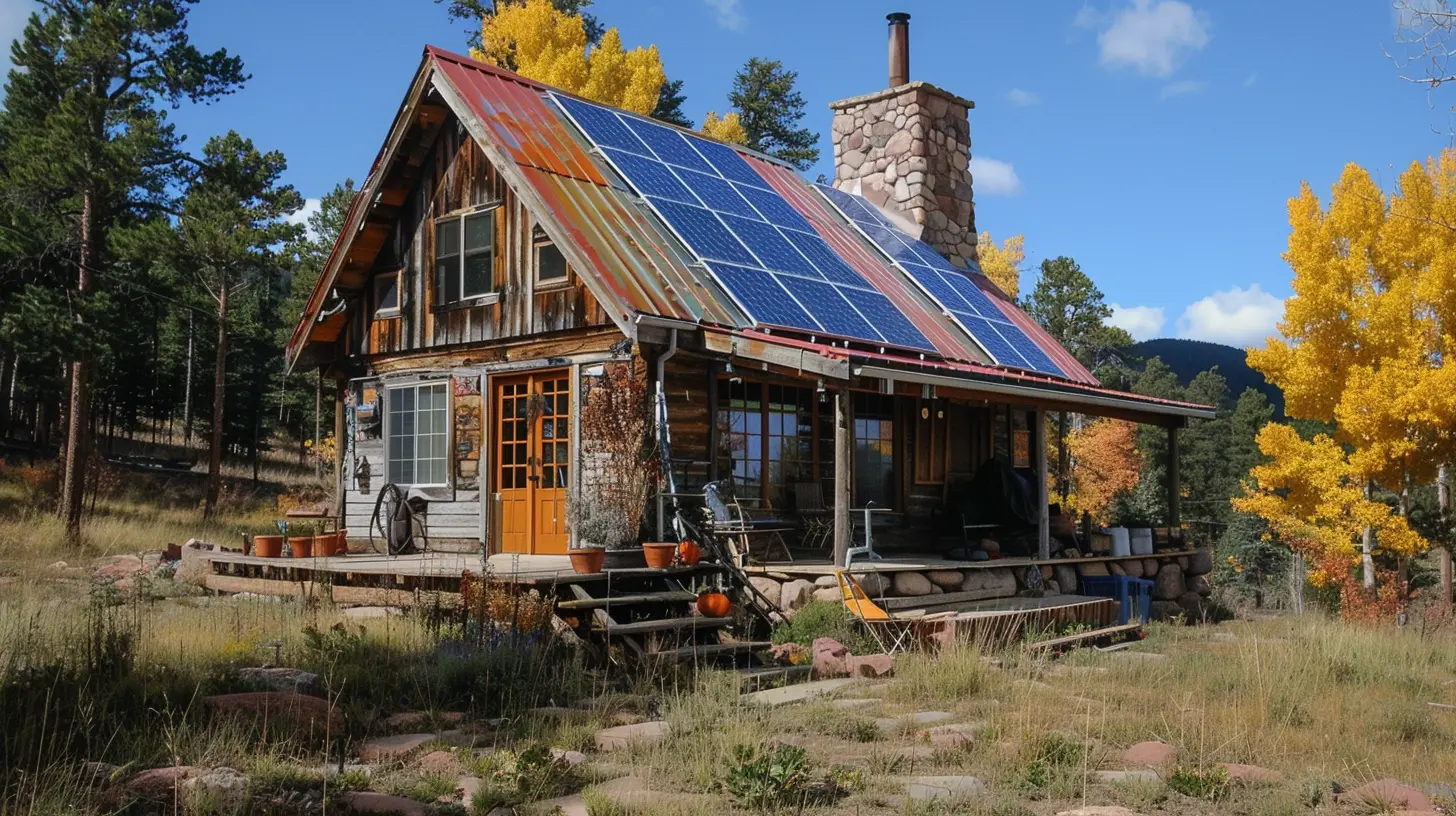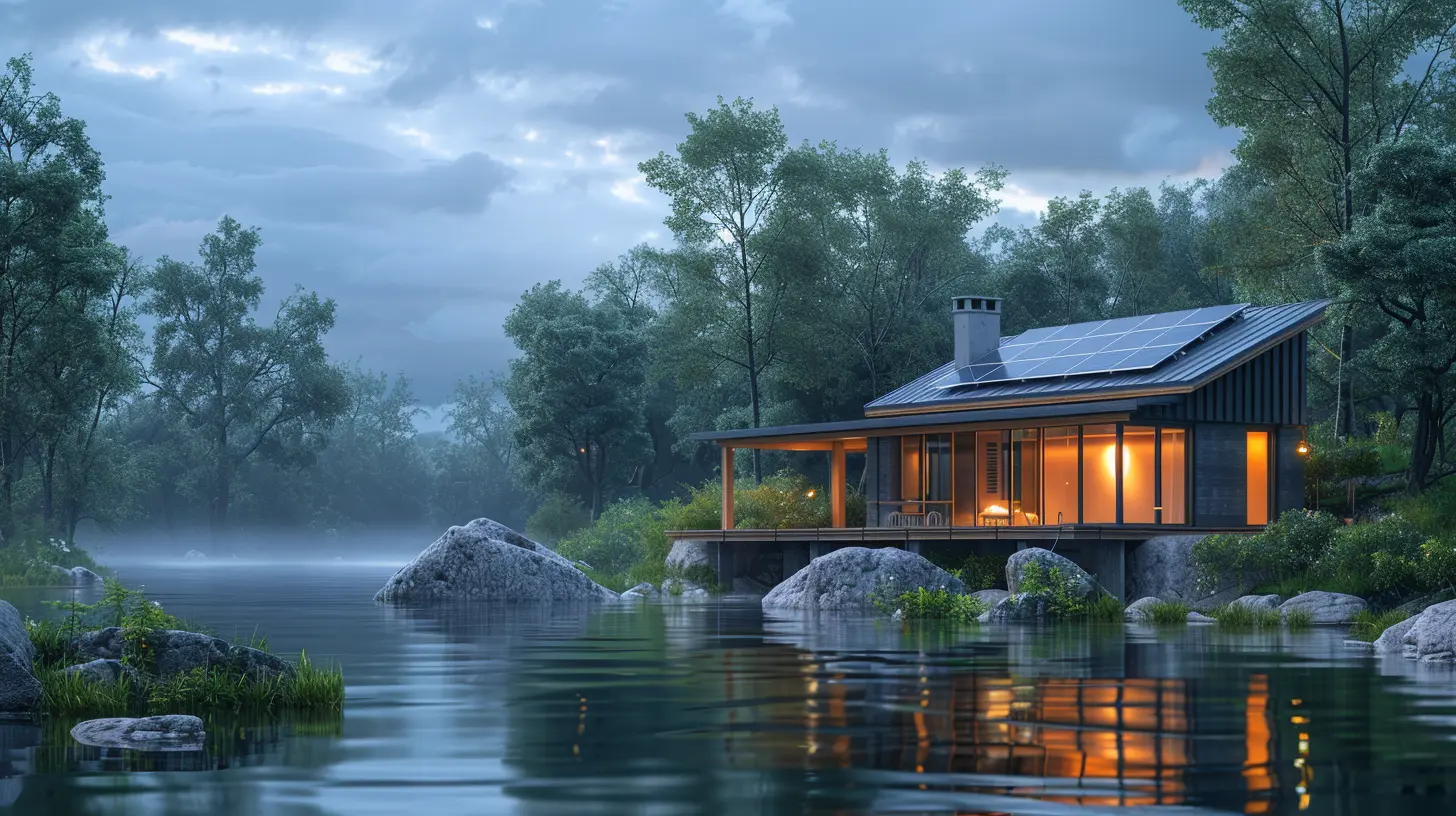Off-Grid Solar Systems: A Step Toward Energy Independence
4 December 2024
In this day and age, energy independence has become more than just a buzzword—it's a necessity. With electricity costs soaring and environmental concerns growing by the day, people are looking for alternative solutions to power their lives. One solution that’s been gaining a lot of traction is off-grid solar systems.
If you’re scratching your head, wondering what on earth an off-grid solar system is, don’t worry—you’re not alone. Whether you're tired of relying on the grid or just curious about how solar technology works, you’ve come to the right place. In this article, we’ll dive deep into the world of off-grid solar systems, breaking down everything from how they work to why they might just be your ticket to true energy independence.

What Is an Off-Grid Solar System?
An off-grid solar system is exactly what it sounds like—a solar power setup that operates independently of the traditional power grid. Unlike on-grid systems, which are tied to utility companies and rely on their infrastructure to supply electricity, off-grid systems are completely self-sufficient. They generate, store, and supply all the electricity needed to power your home or business—no outside help required.Think of it like having your own personal power plant. With solar panels soaking up energy from the sun and batteries storing that energy until you need it, you can live entirely off the grid (literally!).
How Does an Off-Grid Solar System Work?
The concept might sound simple, but there’s actually a lot of tech working behind the scenes. Here's a breakdown of the key components that make an off-grid solar system tick:1. Solar Panels: These are the heart of the system. Solar panels capture sunlight and convert it into direct current (DC) electricity. The more panels you have, the more power you generate.
2. Inverter: Most appliances in your home run on alternating current (AC) electricity, while solar panels generate DC electricity. The inverter’s job is to convert DC into AC so you can actually use it.
3. Battery Bank: This is where the magic happens. The battery bank stores excess electricity generated by the solar panels during the day. That way, you can use it at night or on cloudy days when the sun isn’t shining.
4. Charge Controller: Think of this as the system's gatekeeper. The charge controller regulates the flow of electricity from the solar panels to the battery bank, ensuring the batteries don't overcharge or discharge too much—both of which could damage them.
5. Backup Generator (Optional): For those rare times when your battery bank runs low, a backup generator can kick in to keep things running. Many people opt for this as an added layer of reliability.
Why Go Off-Grid?
Now, you might be wondering: why would anyone want to go off-grid in the first place? It’s not just about living like a modern-day pioneer. Here are some compelling reasons why more and more people are making the switch:1. Energy Independence
At the top of the list is the freedom from utility companies. When you’re off-grid, you’re no longer at the mercy of power outages, rising electricity rates, or monopolistic energy companies. You control your own energy supply, which can be incredibly empowering.2. Cost Savings in the Long Run
Sure, the upfront cost of installing an off-grid solar system might make you gulp, but think of it as an investment. Over time, that investment will pay off as you start to save money on monthly electricity bills. Plus, you can say goodbye to those pesky rate hikes from your local utility company.3. Environmental Impact
Let’s not forget the planet. By tapping into the sun's energy, you’re reducing your carbon footprint. Solar power is renewable, sustainable, and doesn’t emit harmful greenhouse gases. If you care about reducing your environmental impact, this is one of the greenest options available.4. Perfect for Remote Locations
If you live in a rural or remote area where connecting to the grid is either impossible or extremely expensive, an off-grid system is a no-brainer. It allows you to enjoy modern amenities without the need for traditional power infrastructure.5. Preparedness for Emergencies
Natural disasters, blackouts, and grid failures—these things happen, and they’re happening more often. With an off-grid solar system, you’ll be prepared to weather the storm, literally and figuratively. You’ll have a reliable source of power when others don’t.
Is Going Off-Grid Right for You?
Okay, so by now, you’re probably thinking off-grid sounds pretty awesome. But before you ditch the grid entirely, it’s important to weigh the pros and cons to see if it's the right fit for your lifestyle.Pros of Off-Grid Solar Systems
- Complete Energy Autonomy: You’re fully independent from the power grid.- No Monthly Utility Bills: Once the system is up and running, you won’t have to worry about ongoing electricity costs.
- Eco-Friendly: Solar power is a renewable, clean energy source.
- Self-Sufficiency: You’ll be prepared for anything—whether it’s a blackout or a natural disaster.
Cons of Off-Grid Solar Systems
- Higher Initial Cost: The upfront cost to install an off-grid system is significantly higher than a grid-tied system.- Battery Maintenance: Batteries need to be replaced every 5-15 years, depending on the type.
- Limited Power Supply: You’ll need to manage your energy usage carefully, especially during periods of low sunlight.
- Space Requirements: Solar panels and battery banks require a decent amount of space, which might not be feasible for everyone.
Factors to Consider Before Going Off-Grid
1. Your Energy Needs
First things first: you’ll need to figure out how much energy you actually use. This will help you determine the size of the solar system and battery bank you’ll need. If you use a lot of electricity (think air conditioning, electric heating, etc.), you’ll require a bigger system.2. Climate and Location
Solar panels rely on sunlight, so the amount of sun your location gets is critical. If you live in a particularly cloudy or rainy area, you might need a larger system or a backup power source to ensure you have enough energy during those low-sunlight days.3. Budget
As mentioned earlier, the initial cost of going off-grid can be steep. But keep in mind, this is a long-term investment. You’ll need to weigh the upfront costs against the long-term savings.4. Lifestyle Changes
Going off-grid requires a shift in mindset. You’ll need to become more conscious of your energy consumption and might have to make lifestyle adjustments, like using energy-efficient appliances and being mindful of when and how you use electricity.
What Does an Off-Grid Solar System Cost?
One of the biggest questions people have about going off-grid is, “How much is this going to cost me?” Unfortunately, there’s no one-size-fits-all answer. The cost of an off-grid solar system depends on a variety of factors, including:- System Size: The bigger the system, the more it’ll cost. A small cabin might only require a few thousand dollars, while a large home could cost upwards of $20,000 or more.
- Battery Type: Lithium-ion batteries tend to be more expensive but last longer and are more efficient than lead-acid options.
- Installation: Labor costs can vary depending on your location and the complexity of the installation.
That said, you can expect to spend anywhere from $10,000 to $50,000 for a fully functional off-grid system, including all equipment, installation, and permits. While the upfront cost is significant, keep in mind the long-term savings and energy independence you’ll gain.

The Future of Off-Grid Solar Systems
As technology continues to evolve, off-grid solar systems are becoming more efficient, affordable, and accessible. Innovations in battery storage, solar panel efficiency, and smart energy management systems mean that off-grid living is no longer just for the ultra-wealthy or survivalists—it’s a viable option for everyday homeowners.With growing concerns about climate change, energy security, and the rising cost of electricity, off-grid solar systems are poised to become an even more popular choice in the coming years. In fact, some experts predict that we’re on the brink of a major shift towards decentralized energy systems, where more and more people generate their own power rather than relying on traditional utility companies.
Final Thoughts
Off-grid solar systems offer an exciting path to energy independence, enabling you to generate and control your own power. They provide a sustainable, eco-friendly solution to rising electricity costs and give you the peace of mind that comes with knowing you’re prepared for whatever life throws your way.However, going off-grid isn’t for everyone. It’s a lifestyle choice that requires careful planning, budgeting, and a willingness to adapt. But if you’re ready to take the plunge, the benefits can be well worth the effort.
So, what do you think? Are you ready to cut the cord and take control of your energy future?
all images in this post were generated using AI tools
Category:
Renewable EnergyAuthor:

Michael Robinson
Discussion
rate this article
22 comments
Oren McTier
Embracing off-grid solar systems transcends mere technology; it signifies a profound shift towards self-sufficiency, resilience, and environmental stewardship. In a world increasingly reliant on centralized systems, these innovations empower individuals and communities to reclaim their energy sovereignty.
February 24, 2025 at 8:40 PM

Michael Robinson
Absolutely! Off-grid solar systems not only promote energy independence but also foster a deeper connection to sustainable living and community empowerment.
Rachael Blevins
Off-grid solar systems symbolize more than just energy independence; they represent a shift in our relationship with sustainability, empowering individuals to reclaim autonomy while fostering resilience in an increasingly uncertain world.
February 5, 2025 at 7:59 PM

Michael Robinson
Thank you for highlighting the broader implications of off-grid solar systems. They truly do empower individuals and promote a sustainable future, reflecting a crucial shift in our approach to energy and resilience.
Xavier McClintock
This article effectively highlights the benefits of off-grid solar systems in achieving energy independence. By harnessing renewable energy, individuals can reduce reliance on traditional power grids, lower energy costs, and promote sustainability. As technology improves and costs decrease, off-grid solutions will become increasingly viable for a wider audience. Great insights!
February 1, 2025 at 3:39 AM

Michael Robinson
Thank you for your thoughtful comment! I'm glad you found the insights on off-grid solar systems beneficial for promoting energy independence and sustainability.
Antonia McFarland
This article raises intriguing questions about off-grid solar systems! How do they compare in efficiency and cost to traditional energy sources? What are the biggest challenges in implementation? I'm curious about real-world success stories and whether they can truly lead to energy independence for individuals and communities.
January 28, 2025 at 3:56 AM

Michael Robinson
Thank you for your questions! Off-grid solar systems can be more efficient and cost-effective long-term than traditional energy sources, especially as technology advances. However, challenges include high initial costs, storage solutions, and regulatory hurdles. Success stories abound, with many communities achieving significant energy independence through innovative solar projects.
Faryn Green
Absolutely loved this article! Off-grid solar systems are such a game changer for anyone looking to embrace energy independence. It's amazing how technology lets us harness the sun's power, reducing reliance on traditional sources. Here’s to brighter, greener days ahead—literally! Can’t wait to explore making this switch myself!
January 23, 2025 at 4:00 AM

Michael Robinson
Thank you for your enthusiastic comment! I'm glad you loved the article and share the excitement about off-grid solar systems. Here's to a brighter, sustainable future!
Preston Wilcox
Great insights on energy independence!
January 19, 2025 at 7:23 PM

Michael Robinson
Thank you! I'm glad you found the insights helpful.
Thistle Hill
Embracing off-grid solar systems is not just a smart choice for energy independence; it’s a powerful step towards a sustainable future. Every installation brings us closer to harnessing nature’s power, reducing our carbon footprint, and inspiring others to join the renewable revolution. Let’s shine bright together!
January 17, 2025 at 8:38 PM

Michael Robinson
Absolutely! Embracing off-grid solar systems not only enhances energy independence but also paves the way for a sustainable future. Together, we can inspire a collective shift towards renewable energy. Let’s continue to shine bright!
Amanda Adkins
Great insights on off-grid solar systems! Excited to see more people embracing energy independence through sustainable solutions. Keep it up!
January 11, 2025 at 8:37 PM

Michael Robinson
Thank you! I'm glad you found the insights valuable. Together, we can promote energy independence through sustainable choices!
Brooks McManus
Great insights! Off-grid solar truly empowers energy independence.
January 4, 2025 at 8:22 PM

Michael Robinson
Thank you! I'm glad you found the insights valuable. Off-grid solar is indeed a powerful step toward achieving energy independence.
Seraphis Patel
Embracing off-grid solar pioneers a sustainable future, redefining autonomy and resilience in energy.
December 29, 2024 at 8:30 PM

Michael Robinson
Thank you! Embracing off-grid solar truly empowers individuals and communities, fostering both sustainability and energy independence.
Audra McConnell
Embracing off-grid solar systems empowers us to take control of our energy future! Let’s harness the sun’s power and step boldly toward a sustainable, independent lifestyle. The future is bright!
December 24, 2024 at 9:30 PM

Michael Robinson
Thank you for your enthusiastic support! Embracing off-grid solar systems is indeed a powerful way to achieve energy independence and sustainability. Let’s continue to advocate for a brighter, greener future!
Liv McDougal
Off-grid solar systems empower users with sustainable energy solutions, reducing reliance on traditional grids and enhancing energy independence.
December 13, 2024 at 12:27 PM

Michael Robinson
Thank you! Off-grid solar systems indeed play a crucial role in promoting sustainability and energy independence, allowing users to harness their own power while reducing environmental impact.
Ulrich Phelps
Embracing off-grid solar is like giving a high-five to Mother Nature! 🌞✨ Let’s harness the sun's power and take a fun step toward energy independence—your future self will thank you!
December 11, 2024 at 9:29 PM

Michael Robinson
Absolutely! Embracing off-grid solar is a fantastic way to empower ourselves and protect the planet. Let’s shine bright together! 🌍✨
Valeris McKnight
Finally, a way to tell the grid to go solar and take a hike!
December 11, 2024 at 5:38 AM

Michael Robinson
Glad you see the potential! Going off-grid truly empowers individuals to harness renewable energy.
Riff Henderson
This article highlights the growing importance of off-grid solar systems in achieving energy independence. It effectively outlines the benefits and challenges, making it a valuable resource for those considering a sustainable energy solution. Practical insights for a greener future!
December 10, 2024 at 11:44 AM

Michael Robinson
Thank you for your thoughtful feedback! I'm glad you found the article informative and useful for considering sustainable energy options.
Carla McCloud
What an inspiring article! Off-grid solar systems truly empower individuals to embrace energy independence while protecting our planet. The future looks bright with sustainable innovations like these—let's harness the sun and create a greener tomorrow! 🌞✨
December 10, 2024 at 4:34 AM

Michael Robinson
Thank you for your kind words! I'm glad you found the article inspiring. Together, we can shape a sustainable future with off-grid solar solutions! 🌱💡
Oscar Mason
This article highlights the growing relevance of off-grid solar systems in the pursuit of energy independence. By emphasizing sustainability, cost-effectiveness, and resilience, it showcases how these systems can empower individuals and communities while addressing broader environmental challenges.
December 9, 2024 at 8:09 PM

Michael Robinson
Thank you for your insightful comment! I'm glad you found the article highlights the importance of off-grid solar systems in promoting sustainability and energy independence.
Vito Matthews
Great article! It’s inspiring to see how off-grid solar systems can empower individuals and communities towards energy independence. The benefits extend beyond sustainability, fostering resilience and innovation. I'm excited to learn more about the technology and practical applications. Thank you for shedding light on this important topic!
December 8, 2024 at 8:43 PM

Michael Robinson
Thank you for your thoughtful comment! I'm glad you found the article inspiring and valuable. There’s so much potential in off-grid solar systems, and I appreciate your enthusiasm for learning more!
Maris McGlynn
Finally, a way to tell the power company, 'Not today, friend!'
December 7, 2024 at 4:43 AM

Michael Robinson
Thank you! Embracing off-grid solar systems truly empowers individuals to take control of their energy choices.
Corinne McGinnis
Off-grid solar systems are a transformative solution for achieving energy independence. By harnessing solar power, users can reduce reliance on traditional grids, lower energy costs, and promote sustainability. As technology advances and costs decrease, more households and communities are empowered to embrace this clean energy alternative and minimize their carbon footprint.
December 6, 2024 at 11:57 AM

Michael Robinson
Thank you for your insightful comment! I completely agree that off-grid solar systems play a crucial role in promoting energy independence, sustainability, and reducing costs. Your points highlight the transformative potential of this clean energy solution.
Solara Bass
Great article! Off-grid solar systems truly empower individuals to take control of their energy needs while embracing sustainability. It’s exciting to see such innovative solutions paving the way to a more independent and eco-friendly future!
December 5, 2024 at 4:28 AM

Michael Robinson
Thank you! I'm glad you found the article helpful. It's inspiring to see the growing interest in off-grid solar solutions for a sustainable future!
Quentin McElroy
Absolutely love the idea of off-grid solar systems! They empower us to harness the sun’s energy and take control of our power needs. Cheers to a brighter, more sustainable future where we all enjoy energy independence! 🌞✨
December 4, 2024 at 12:27 PM

Michael Robinson
Thank you! I’m thrilled you share the enthusiasm for off-grid solar systems and their potential for energy independence. Here’s to a sustainable future! 🌞✨
MORE POSTS

The Benefits of Using Progressive Web Apps (PWAs)

Best Practices for Implementing Real-Time Features in Apps

Multi-Function Gadgets for Simplifying Your Packing List

Innovations in Hydroelectric Power: A New Era of Energy

How to Choose the Right Content Creation Platform for Your Needs

Best Tools for Creating Eye-Catching Social Media Content

How to Develop Apps for Foldable Smartphones

How Blockchain is Redefining Identity Verification

The Best 4K Monitors for Gaming and Productivity

How Virtual Reality Could Change the Future of Dating and Relationships

How the Metaverse Could Shape the Future of Competitive Gaming
The Best Fitness Smartwatches for Tracking Your Health Goals

The Role of AI in Modern Digital Camera Technology